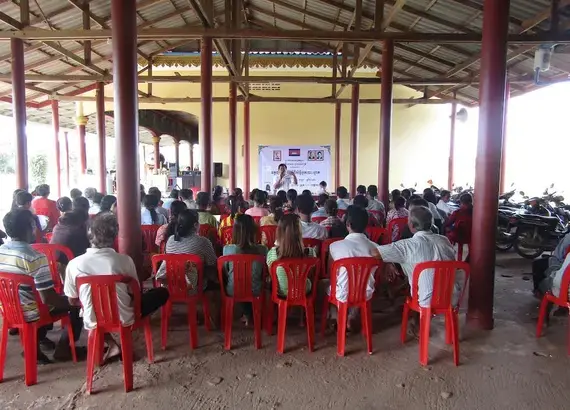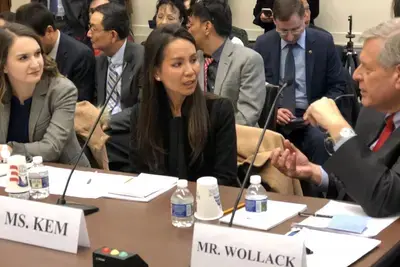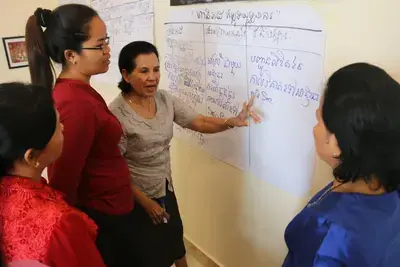
ADHOC voter sensitization training on October 29, 2016, in Prek Svay village, Tmor Don Pov Commune, Tmor Bang District, Koh Kong.
Success Story
Voter Education in Cambodia Boosts Rural Voter Engagement
The remote location and socioeconomic status of many Cambodian provincial communities have historically marginalized rural voters from the political process. During Cambodia’s 2013 election, a lack of civic education led to frequent misunderstandings of the electoral process, deterring many rural voters from casting ballots. To curb this trend in the upcoming 2017 and 2018 elections, the Cambodian Human Rights and Development Association (ADHOC), has launched a campaign of voter education workshops throughout the country, with profound interest from rural voters.
ADHOC’s workshops have drawn a larger and more engaged audience than expected. The 79 workshops held in the first year of the USAID-supported Cambodia Democratic Reforms program drew an average of 100 participants each, 25 percent more than the expected average of 80. A workshop held in the Moung Russey district, Battambang province, attracted 166 participants, more than twice the initial number ADHOC had expected. If such high attendance continues, ADHOC’s 350 planned workshops will educate over 35,000 rural voters across Cambodia.
These remarkable attendance rates are partially attributed to ADHOC’s strategic scheduling, as many rural voters had time to spare in the agricultural off-season. However, provincial trainers stressed that the trainings’ popularity is due to much more than convenient timing. These trainers believe the high turnout is reflective of villagers’ enthusiasm to engage with their country’s political systems. Participants across the 16 provinces where the workshops were held readily engaged in discussions of electoral and democratic processes. In several trainings, participants even asked for additional flyers and pamphlets to take home to share the workshop’s lessons with their families and neighbors.
The interest in the workshops continued even in Cambodia’s northeastern provinces, where a number of indigenous languages are spoken by ethnic minorities. Where possible, ADHOC sought translators to present alongside provincial trainers, ensuring content was received and understood by groups facing a high-risk of disenfranchisement.
The workshops’ high turnout would not have been possible without constructive relationships with village and commune officials. ADHOC made efforts in each province to inform local authorities of the workshop and its contents. Despite some resistance from a few provincial authorities, all workshops were successfully delivered without interruption. ADHOC’s staff will continue to diligently monitor political developments in Cambodia, though its diplomacy with subnational authorities has left ADHOC cautiously optimistic about the success of the remaining workshops, and the engagement of the citizens that will attend. Koch Chay, a 54-year-old farmer from Cham Moul commune in Tboung Khmum province, summed ADHOC’s reason for optimism, explaining that before the workshop,
My family and I hadn’t registered to vote. I didn’t understand why it was important to vote for commune councilors in 2017. Now, after the ADHOC training, I’ve decided to go and register with my family.
ADHOC is currently building on its voter education efforts by hosting a series of political dialogues in the same communes. The dialogues feature representatives of political parties, allowing citizens to directly raise their questions and concerns with local leaders. Citizens then hear the positions of both incumbent councilors and opposition hopefuls on each issue. With the training provided by ADHOC, citizens attending the dialogues listen to each candidate fully aware of their ability to select between them.
Chan Sray Den, a 27-year-old from Bas Ta Aam village, Choam Tamou Commune, Memot district, Tbong Khmum province, reported a similar experience. “I had no plans to register to vote, because I didn’t understand the process. But after learning about the voting process in the ADHOC training, my family and I have decided to register our names.”



